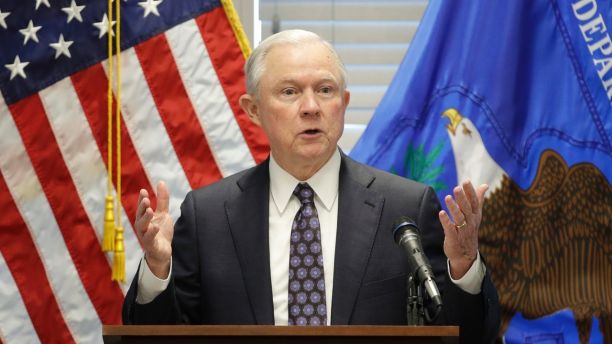
Jeff Sessions is under fire today for having used a term correctly, appropriately, and in its entirely proper context. Per CNN, Sessions told the National Sheriffs Association:
“I want to thank every sheriff in America. Since our founding, the independently elected sheriff has been the people’s protector, who keeps law enforcement close to and accountable to people through the elected process,” Sessions said in remarks at the National Sheriffs Association winter meeting, adding, “The office of sheriff is a critical part of the Anglo-American heritage of law enforcement.” “We must never erode this historic office,” Sessions continued.
Which part of this pabulum inspired outrage? Here’s Brian Schatz, a U.S. Senator to explain:
Do you know anyone who says “Anglo-American heritage” in a sentence? What could possibly be the purpose of saying that other than to pit Americans against each other? For the chief law enforcement officer to use a dog whistle like that is appalling. Best NO vote I ever cast.
— Brian Schatz (@brianschatz) February 12, 2018
Brian Schatz is a lawmaker in the United States Congress. In fact, as a senator, he’s more than that: He’s one of just 100 people in this country who get to confirm federal judges, including to the Supreme Court. And, apparently, he’s unaware of what the term “Anglo-American heritage” means. We’re screwed. Schatz is not alone. Inexplicably, Sessions’s comments ignited an instant firestorm on Twitter. This reaction was typical:
https://twitter.com/krassenstein/status/963184692227813376
Let me put this impolitely: This is moronic. And not just a little bit moronic. This is so moronic, so dim, so utterly and incandescently stupid that I frankly worry for the future of the republic. I have been reading through these reactions for a few hours now, and I can still scarcely imagine the rank historical and legal illiteracy that it takes to hear “Anglo-American” in such a context and to assume it’s a racial reference. Sessions could not have been more clear if he had tried. His talk was to sheriffs — about sheriffs. His subject was the “historic office” that most of his audience filled. His point — “literally”! — was that, “since our founding, the independently elected sheriff” has played a “critical” role within a law enforcement system that developed in England and was then adopted in America. (“Sheriff” derives from a combination of the word “shire” and the word “reeve.”) In order to make that point at that talk, he said, “The office of sheriff is a critical part of the Anglo-American heritage of law enforcement.”
It is hard to overstate just how commonly used this phrase is in this context. Within the law, “Anglo-American” does not mean “white.” It does not mean “the KKK.” It is not a “dog whistle.” It is fundamental. It is used — shock! — to refer to those institutions, ideals, structures, and customs that are common to England and the United States — that is, to the common legal heritage the two countries share. Most basically, it means “common law,” but it can also apply more broadly. There is, for example, an identifiable “Anglo-American” conception of due process, which is distinct from, say, the Napoleonic system. That some people also use the word “Anglo” to mean “white” has no bearing on this. Has Senator Schatz never read a history book? Know who had read a history book? Or at least had read a legal book? President Barack Obama, who, like Jeff Sessions but unlike Senator Schatz, is a lawyer. Here’s Senator Obama in 2006, arguing in favor of habeas corpus on the Senate floor:
The world is watching what we do today in America. They will know what we do here today, and they will treat all of us accordingly in the future—our soldiers, our diplomats, our journalists, anybody who travels beyond these borders. I hope we remember this as we go forward. I sincerely hope we can protect what has been called the “great writ”—a writ that has been in place in the Anglo-American legal system for over 700 years.
And here’s Obama during the 2008 campaign, making broadly the same point:
But Obama, who taught constitutional law at the University of Chicago for more than a decade, said captured suspects deserve to file writs of habeus corpus. Calling it “the foundation of Anglo-American law,” he said the principle “says very simply: If the government grabs you, then you have the right to at least ask, ‘Why was I grabbed?’ And say, ‘Maybe you’ve got the wrong person.’” The safeguard is essential, Obama continued, “because we don’t always have the right person.”
And here’s Obama as president, at it again:
Obama would not say whether it could be achieved within the first 100 days of his term, citing the challenge of creating a balanced process “that adheres to rule of law, habeas corpus, basic principles of Anglo-American legal system, but doing it in a way that doesn’t result in releasing people who are intent on blowing us up.
This usage — which is precisely the same as Sessions’s — is common, it is quotidian, it is downright normal. It is found in legal textbooks, in works of history, and in Supreme Court opinions alike. More important, it’s extremely useful. We need a term that means “long within the unusual legal tradition that predated the independence of this nation,” and “Anglo-American” works perfectly in that role. If we allow it to be taken from us by the hysterical and the unlettered, we’ll be considerably worse off for it.
Source: National Review




Be the first to comment